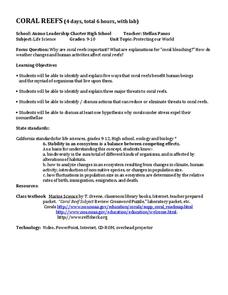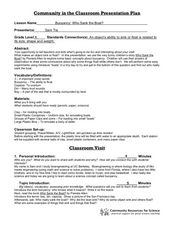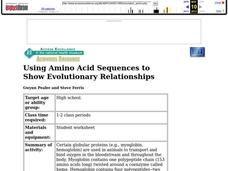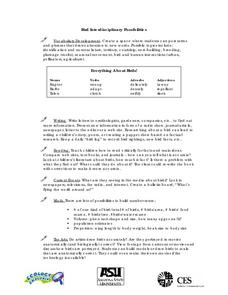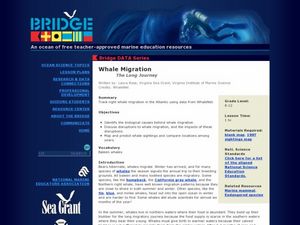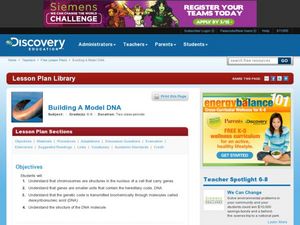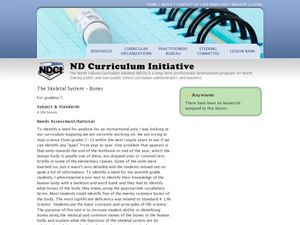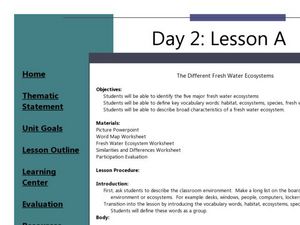Curated OER
Coral Reefs
Students research coral reefs and identify their benefits to humans, threats to the reef, how to reduce and eliminate threats, and more. In this coral reef lesson plan, students research the reefs, and take a field trip to an aquarium.
Curated OER
Shark Attack Odds and the Importance of Sharks
Middle schoolers examine an ecosystem. In this food web lesson, students discover the importance of sharks and what threat sharks actually pose to humans. They participate in class discussions and work independently on a couple of...
Curated OER
Modeling African American Scientist Ernest Just's Experiment on Parthenogenesis
A multicultural science lesson, students read a brief biography of Ernest Just and create a talk show in which they will perform an experiment after Just's work. With this lesson, students are taught to appreciate the contributions made...
Virginia Department of Education
Structure and Function of Cell Membranes
Lead your high school class on an exploration inside the cell. Individuals investigate the relationships between cells structure and function given their relative locations on the cell membrane. They explore the concept of homeostasis...
Curated OER
Investigate Science Using Crayfish
Young scientists discover the importance of scientific investigation by observing live crayfish. They carefully observe the patterns of crayfish in different environments. Then they discuss their conclusions and define what all living...
Florida International University
Design Your Own
Apply scientific principles to designing an experiment to study organisms living on the coral reef in our oceans. Through reading, individuals learn about the coral reef ecosystem and important factors that affect its function. Using the...
Curated OER
Do You See What I See?
Students engage in a activity that differentiates between right and wrong types of observations. In order to conduct the experiment they are provided with leaves and nameless objects with different designs. The two are compared and...
Curated OER
From Restriction Maps to Cladograms
Biology aces analyze restriction maps to determine the relationships among different primate species and then complete a cladogram. Preface this lesson with an explanation of how restriction enzymes are used to create the DNA maps....
Curated OER
The Science of Respiration and Blood Circulation
Fifth graders study how respiration and circulation are connected. In this respiratory lesson plan students complete several activities to better understand heart rate and carbon dioxide in the body.
Curated OER
Perception and Observation
Students use common and unusual objects to make observations of details, design, and functionality. They describe and draw each object while working in small groups. The differences between observation and perception is covered as part...
Alabama Learning Exchange
Heads, Shoulders, Knees, and Toes
The identification of various parts of the human body is the focus of this biology lesson plan. Young scientists sing the song "Head, Shoulders, Knees, and Toes," and trace the human body onto butcher paper. Additionally, they label the...
Curated OER
Galileo's Thermometer: Measuring the Density of Various Unknown Liquids
Sprouting scientists explore the concept of density by making mass and volume measurements for five different liquids. From these measurements, they calculate densities. They apply their learning to explain Galileo's thermometer works...
Curated OER
All About Seeds!
First graders learn all about seeds. In this biology lesson plan, 1st graders discover: what a fruit is, what is inside of seeds, and how seeds are transported.
Curated OER
Buoyancy: Who Sank the Boat?
Students examine whether objects will sink or float. In this buoyancy instructional activity students bring in objects and experiment to see if they sink or float.
Curated OER
Using Amino Acid Sequences to Show Evolutionary Relationships
Compare protein fragments, count amino acids, and use the information to explore common ancestry. The resource mentions a student worksheet, however, a separate printable worksheet is not provided. The exercises are written into the...
Curated OER
Using Amino Acid Sequences to Show Evolutionary Relationships
Junior biologists compare the amino acid sequences from fragments of five different globin molecules. They count the letter differences between each species pair. They construct a graphic representation of the evolutionary relationships...
Curated OER
The Life And Times Of The Apple
Learners engage in a study about the biology of apples that includes growth and reproduction. They conduct research using a variety of resources. Students write a description of an apple brought to class by answering several questions....
Curated OER
Bird Interdisciplinary Possibilities
Students explore birds, their territory, breeding, and seasonal movement. They research and collect information on birds through writing letters to ornithologists, reading in books, comparing web sites, and observing pictures. Students...
Curated OER
Whale Migration - The Long Journey
Marine biology learners examine right whale sighting data from the WhaleNet website. They plot the data on a map and write down the number of adults and calves spotted. Questions accompany the data analysis activity, making this a...
Curated OER
What Happens When A Cell Divides?
Students investigate the cycle of mitosis. In this biology lesson plan, students discuss the different stages of mitosis through cell reproduction. They further their investigation through laboratory analysis.
Curated OER
Building a Model DNA
Students explain the function of DNA in the body. In this biology lesson, students build a DNA model using simple materials. They demonstrate how bases pair up in the helix.
Curated OER
The Skeletal System - Bones
Seventh graders identify the common bones in the human body. In this biology lesson, 7th graders research two bones assigned to them. They explain why bones are important to us.
Curated OER
The Different Fresh Water Ecosystems
Young scholars summarize the characteristics of an ecosystem. In this biology lesson, students identify five major fresh water ecosystem. They define terms and write a journal about what they learned.
Curated OER
Characteristics of Living Things
Seventh graders identify the characteristics of living and non-living things. In this biology lesson plan, 7th graders define vocabulary words as they go through the lesson plan. They answer a crossword puzzle after class discussion.


